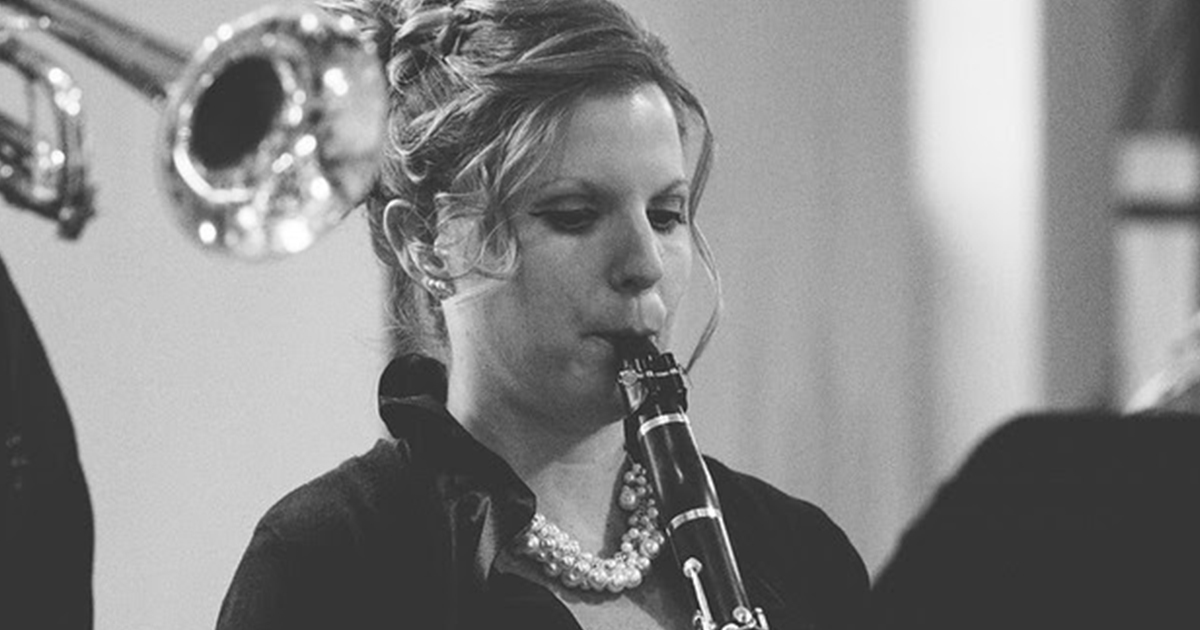A Band Director Discussion About Woodwind Fundamentals, Method Book Recommendations, Equipment and More
with Mallory Merkel
Date Posted: January 02, 2019

What grade levels do you teach?
I teach at Slinger Middle School in Milwaukee, WI. I'm primarily at West Milwaukee Intermediate School, teaching 6th-8th grade band. I also teach 5th grade band at three of our feeder elementary schools.
How long have you been a band director for?
I'm currently in my 8th year of teaching.
What is your teaching philosophy when approaching beginner clarinet and saxophone?
My goal when teaching beginner clarinet and saxophone is to create an open and positive environment for all learners. The process of learning to play an instrument should be an exciting experience, as well as one that builds discipline. I set attainable musical goals tailored for each individual's own progress, and then make any necessary adaptations to my teaching to ensure that I'm meeting the needs of every learner.
"The process of learning to play an instrument should be an exciting experience, as well as one that builds discipline." - Mallory Merkel
Do you say anything specific for your clarinetists? Your saxophonists?
When teaching both clarinet and saxophone I emphasize the fundamentals right at the beginning. I make sure posture and embouchure are set properly so that we can get a good sound at first. I have found that focusing on those fundamentals right away creates a bigger payoff in the end. When we start with good habits of good posture, embouchure, and tone production, it gives us less to worry about later on when we are focusing on technique.
What kind of equipment recommendations do you make to your students?
I've always been a Vandoren devotee so I was really excited to try JUNO when they first debuted. I found the JUNO reeds to be very consistent in quality, reliable, and definitely a go-to for my students. They offer a great tone and response - even for my beginner students. I've been known to use them for myself in a pinch in the classroom sometimes! I know if I can produce a great sound on them, they're going to be great for my students as well. My students know that they can depend on JUNO to help them achieve a quality sound so that they can focus on the other aspects of their learning and playing. They don't have to worry about the sound they're getting.
As an educator, I'm really glad that I have a reed that I can confidently recommend to young musicians. I think I recommend JUNO reeds more than any other brand when it comes to my beginner students.

What is the greatest challenge you've faced as a band director and how have you addressed it?
I think my biggest challenge as a band director is likely the same as many of the other band directors that are out there: dealing with the financial constraints of the school district, as well as scheduling conflicts due to mandated testing and other requirements of our ever changing educational climate.
These topics are always best addressed through fierce advocacy of our art: building a program that is backed by supporters, parents, and the community takes time and effort, but it's really vital to our survival. Building a strong parent base and having parents in your corner is a big thing. They'll always be willing to fight for their children, and I'm certainly going to bat for my students, too. Being an advocate is the biggest thing we can do to address those challenges.
What kind of methods books do you recommend to your students?
For me, primarily I've been using the Essential Elements series for beginners and then I've been supplementing that with The Simple Rhythmatician by David Newell. I've found that supplementing with that rhythm book has really helped my beginners develop an understanding of rhythm and counting. That would be a big recommendation for me.
For my intermediate students, I like the Rubank method books - both for clarinet and saxophone. I think old standards are the way to go.
And then for my advanced clarinet students, there's the standard: the Klose, the Rose studies, the Baermann scale book, and I also really like the Clarinet Collection which is published by Hal Leonard. It's a great resource for solo works for clarinet and then it's leveled into three different volumes based on skill. The recordings that go along with this series feature Milwaukee's own Todd Levy, principal Clarinet of the Milwaukee Symphony Orchestra, which is a great connection for us!
"Music is something that you can do as a career, a hobby, or both. It really can be a life-long pursuit." - Mallory Merkel
What can be done to encourage students to continue with band transitioning from middle to high school? What works?
I always tell my students that starting on an instrument is the hardest part. The first 2-3 weeks when it's brand new to you is the most difficult. If we can get past those first couple weeks, the rest is going to be a cake walk!
I regularly make video recordings in the class that we'll go back and listen to throughout the year so that they can hear their progress. I constantly am reminding them of the 'remember when...'
Those constant reminders of how far they've come in a short amount of time are really important.
And next, looking into the future and thinking how far we could go. I tell my students although I would love it if they would all become professional musicians or educators, I know that's not realistic, but I do hope they become life-long consumers of great musical experiences. Whether that be as performers or listeners, they're building skills that will serve them for a lifetime.
They know that I play with other musicians in other professional groups and some of the other musicians I play with are well in their 80s and they're still playing their instruments. Music is something that you can do as a career, a hobby, or both. It really can be a life-long pursuit.
What are you most proud about your band program?
I teach in a very culturally and economically diverse community. Nearly all of my students come into the band program with little to no musical experience. This creates an opportunity for a level playing field, and my students are brought together through the communal effort of learning to play on an instrument and learning to play together as part of an ensemble.
I'm proud that my band room is a safe-haven for many and a place where they know they can find success and thrive, even if they may be facing challenges in other classes or elsewhere. My students are brought together through music and grow not only as musicians, but as people.
I love that within my program, there's been many students who have built up a lot of confidence over what they're able to do through their playing. My students are very encouraging of one another. They were all brought together of learning how to play music together and I'm very proud of that aspect our program.

Mallory Merkel and students pre-concert!
Subscribe to the We Are Vandoren E-newsletter (WAVE) to receive 4 weekly articles for Performers, Students, and Educators